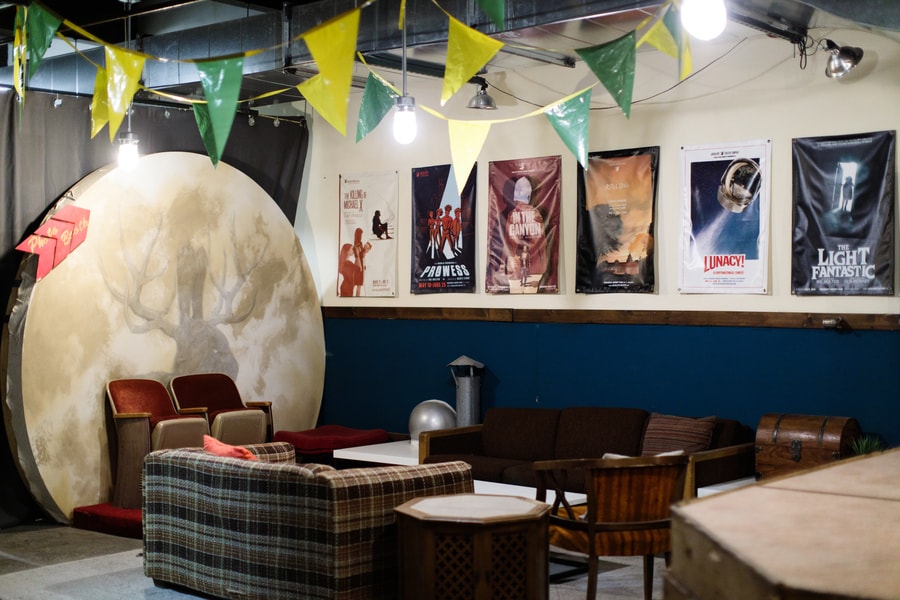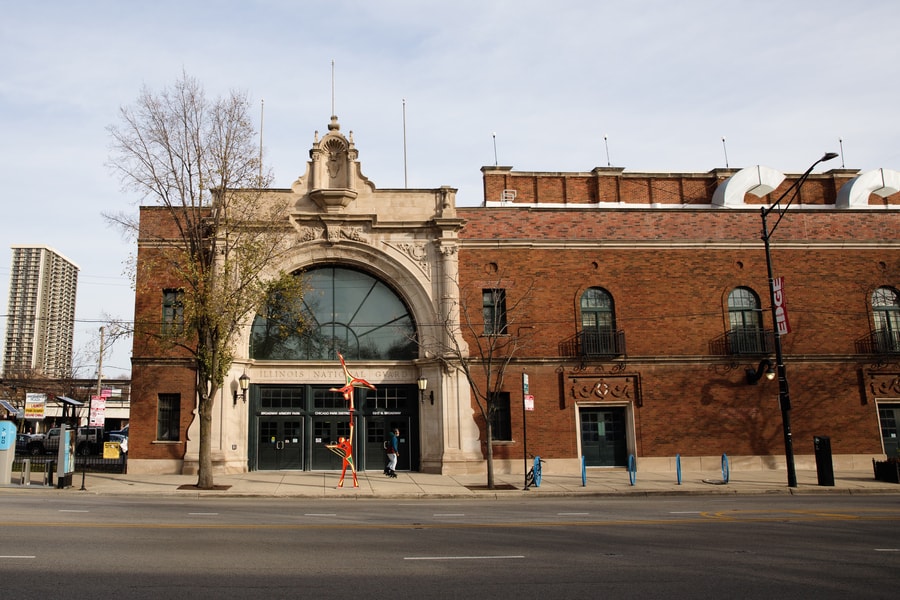Last summer, I received a press release that proceeded to plague my curiosity for months. Jackalope Theatre Company announced that they were canceling their world premiere production of Pretty Shahid, a new play about a family who immigrated to Chicago from Iraq just as 9/11 happened. Written by former Jackalope company member Omer Abbas Salem and directed by Sophiyaa Nayar, the play was originally set to run June 16-July 23, 2023. We received the press release on June 16 saying that the show would not go on as planned.

Now, this wasn’t the only cancellation notice we’ve received, especially in recent years, and it’s not even the first one we’ve gotten on the day a show was supposed to begin performances. But many of those notices have in recent years been tied to Covid. This wasn’t. A joint statement at the time from Jackalope’s board and leadership stated cryptically that the production “experienced multiple issues” that “brought it to a halt.” Last month, I had a chance to sit down with Jackalope’s artistic director, Kaiser Ahmed, who talked me through one of the issues the statement was referring to: Jackalope having to move from their Chicago Park District home to make room for asylum seekers coming to the city.
I later learned (after publishing an earlier version of this story) that Pretty Shahid was also mired in a number of other production issues, leading a group of at least eight company and staff members to step away from the beloved storefront company, leaving it in a cloud of lingering uncertainty even as the dust has begun to settle on a venue move and a 16th season announcement.
A bit of background for non-Chicagoans: Jackalope’s home space for years was in Broadway Armory Park, the largest indoor recreational facility under the Chicago Park District and a crucial community hub for the Edgewater neighborhood. According to Alderwoman Leni Manaa-Hoppenworth’s office, it is one of the most used Park District facilities in the city. Jackalope has been creating theatre and providing classes on the second floor of the building for a decade, and when the pandemic hit, they set about expanding their Armory space and officially retiring a nearby Edgewater storefront, the Frontier, that they had also previously used.
Fast forward to early 2023, when Ahmed said the company began to hear of a shift on the horizon, both for the city of Chicago and for Jackalope’s home park. There were rumblings that the Armory building would be called upon to provide temporary shelter for asylum seekers coming into Chicago. In May, the company had conversations with the Park District about what might happen for the company if the Armory was called upon for that use.
Jackalope had moved before, during the quarantine days of the pandemic, when the Armory was used as a homeless shelter, also resulting in the temporary displacement of the company. Basically, Ahmed recalled, the Park staff moved out and the city staff moved in. It amounted to “a complete shutdown of the building,” as Ahmed put it, though the impact of not being able to access the building was mitigated by the fact that the company was already working digitally due to the pandemic lockdown.
The whole thing is tricky, because Jackalope doesn’t own their space. They have a use contract which commits the park space to the company, in return for which the company provides classes and services for the parks. Every few years, Ahmed said, there’s a renewal process to ensure the relationship between the company and park remains mutually beneficial. Ahmed lauded the park supervisors for their effort, both in this partnership and in their aid in navigating recent months of uncertainty for the company—all of this happening as the city was seeing a new administration take over, with Mayor Brandon Johnson succeeding Lori Lightfoot. Manaa-Hoppenworth was also a new alderwoman for the area.
Ahmed said these numerous transitions made for a hectic back-and-forth around the end of May as the company worked with the Park District to find a new park space for Jackalope to call home, for a while at least. Ahmed emphasized that the feeling he got, both from the city and from the Park District, is that everyone involved wanted to ensure that the relationship between the parks and these community-centric organizations wasn’t disrupted.
“They were true to that,” Ahmed said. “Everything they knew, as they knew it, we knew. That was very, very helpful for us to be able to pivot and move and land solidly on our feet again.”
By the beginning of August, migrants began arriving at the Armory as the city moved forward with its plans to transform the community center into a temporary shelter for 250 people. You can read from a number of news sources at the time some discontent, to say the least, from community members who relied on the numerous programs and services that had previously operated out of the Armory. But Ahmed said he never wavered from the conviction that, despite the difficulty for Jackalope, the city providing this space for asylum seekers was the right thing to do. According to Manaa-Hoppenworth’s office, the city is working to expedite resettlement and visa programs, and the use of the Armory is scheduled to be reevaluated every six months, with the first reevaluation set for next month.
“Neighbors are demanding that the city keep its promise to reevaluate the need for the Broadway Armory Shelter after six months,” Manaa-Hoppenworth’s office said in a statement, emphasizing that many in the community have welcomed the new families with open arms. “The Broadway Armory Park exists because the Edgewater community, along with our previous Alderwomen, fought for this community resource, and we are looking forward to bringing Parks programming back to the facility as soon as possible.”

From the outside, this all seems pretty straightforward: Here was an opportunity for a company to work with a local parks department to continue serving a loving neighborhood theatre community. What muddies the picture is that, while all this was going on, around 8 Jackalope ensemble and staff members opted to step away from the company, including managing director Tina El Gamal. In an email to American Theatre, El Gamal characterized the closure of Pretty Shahid not as a result of the city’s need for the Armory space, but as a result of mismanagement of the “production, scheduling, and hiring/casting process” for the show. (El Gamal has also written for AT.)
Ahmed confirmed El Gamal’s departure, with board president Rachel Slavick adding, in a statement, that in recent years Jackalope was in the process of restructuring to rely more heavily on paid staff and less on its artistic volunteer ensemble. “Being the managing director of Jackalope is an enormously difficult job under typical circumstances, and these were not typical times for many reasons,” said Slavick in a statement. Slavick also stated, “El Gamal’s decision to leave in June, while somewhat surprising at the time, was fully supported by the board.”
Pretty Shahid playwright Omer Abbas Salem echoed El Gamal’s thoughts, noting a number of production missteps that preceded the city’s move into the Armory. Salem mentioned that due to confusion around the production calendar, there were only three days of pre-tech rehearsal with all actors present. Salem met with Ahmed and other stakeholders, he said, to try to find solutions and a way forward for the production. It was after that meeting, Salem said, that the company received a group email saying the production was canceled, with the note citing the city’s need for space.

Given that “there were issues that stopped the production before this need of the space from the city,” Salem said, he and his colleagues view Ahmed’s story about the city’s need for the Armory “as an excuse” that “doesn’t allow us to assess the mistakes that happened that can be fixed for next time.” In a statement, Slavick said that, after the initial postponement of Pretty Shahid, the board of trustees launched an investigation into all of Jackalope’s working policies and procedures, though Slavick declined to go into the results of said investigation.
In June of last year, a cultural consultant was brought in, originally to “converse with the board about how to cultivate and implement DEI forward policies for the company as they were seeking to engage in a reconciliation conversation with the ensemble,” according to the consultant’s final assessment. According to Slavick, the consultant was brought in as “an objective and trusted person to all parties” who was hired as a “conflict resolution consultant” focused on “rebuilding clarity and trust with the ensemble” following El Gamal’s departure, as well as providing EDI input “as we addressed company-wide policies of transparency, oversight, and accountability.”
The final assessment from the cultural consultant also points to why Jackalope’s recently announced 16th season does not include a rescheduled Pretty Shahid. It notes that Jackalope’s leadership (which now includes co-founder Andrew Swanson as interim executive director since El Gamal’s resignation) is “under the impression” that Salem wouldn’t trust Jackalope with his show.
In a statement, Ahmed confirmed that they started finalizing plans for the 16th season last fall, following “several months of conflict resolution attempts that had heartbreaking results,” and after the new relationship with the parks was solidified. “We found that the partnership between Jackalope Theatre and the playwright of Pretty Shahid was no longer viable,” Ahmed’s statement, which also praised the play itself, continued. “Omer Abbas Salem deserves to work with a company he trusts, under leadership that he feels supported by, and it was clear we couldn’t give him that.”
Salem said this feels like “gaslighting.” As he put it, “I wasn’t just deciding that Jackalope was untrustworthy or unable to produce a show—they literally canceled the show because they were unable to produce it. My point, after that, was: If we can come up with a structure that allows fewer of these mistakes to happen, then that’s definitely something that I would want to produce with.”
El Gamal’s resignation letter, provided to American Theatre, echoed sentiments voiced by others close to the project: concern about the direction of the company, as well as about what they see as Ahmed and the Jackalope board’s resistance to accountability.
“Artists deserve a safe and soft place to land, create, be respected, and be compensated for their time and talents,” said El Gamal in a resignation letter urging the company to undergo changes moving forward. “I made every effort to create a space worthy of our community. I believed if I could only work harder, I could compensate. I now know that this is untrue. It doesn’t matter how brilliant, hard-working, or dedicated any managing director, staff member, or company member is when the theatre is not built to support them.”

Meanwhile, Jackalope announced last September that they’d found a new temporary home for their administration and classes at a Park District space a little further north, Loyola Park Fieldhouse, setting the stage for a potential multi-park partnership that could eventually see Jackalope returning to the Armory as its home base, with Loyola Park and potentially Berger Park in their back pocket. By January, Jackalope had announced that they will finally retake the stage at Edgewater’s Berger Park with The Smuggler (Feb. 16-March 16) by Ronán Noone, directed by former Jackalope and Book-It artistic director Gus Menary.
“After a challenging and transformative year, we’re building momentum in a new era for our company,” Ahmed said in a statement alongside the show’s official announcement. “By producing in Edgewater at Berger Park Coach House and operating at Loyola Park, we are strengthening connections to our community while expanding our neighborhood footprint.”
This article has been updated from its original form to correct and clarify some of the additional circumstances that surrounded the cancellation of Jackalope’s production of Pretty Shahid.
Jerald Raymond Pierce (he/him) is the Chicago Editor for American Theatre. jpierce@tcg.org





